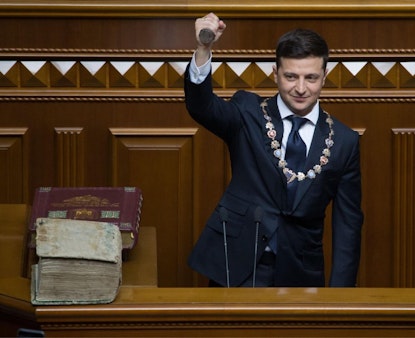Will Ukraine’s new president set the seal on open contracting?

Political transitions are always a nervous time for those working on government reforms, especially when a country has seen a lot of positive changes. Ukraine’s ProZorro reforms are an open contracting poster child. The new president Volodymyr Zelensky ran on a platform of anti-corruption, but as he marks his first 100 days in office, is he walking the talk? With a new majority in the parliament, the incoming government has an opportunity to continue much-needed reforms.
So far, we are pleased to report, so good. The team declared zero tolerance for corruption and a “pivot to” rapid economic development. Public procurement will play an important role in achieving these goals and there are positive signs that the procurement system will remain a priority. On its first day, the new parliament shared a new draft law that would make using ProZorro for competitive procedures of small-value tenders mandatory. The president immediately declared this “urgent” and asked the parliament to adopt it as soon as possible.
The president has actively promoted the fully-open sale system based on the Open Contracting Data Standard – ProZorro.Sale. In particular, he asked the parliament and the government to ensure all legislation and infrastructure to use the system for the sale of bankrupt companies’ assets and lease of state and municipal assets.
Even without changes in legislation, we already see cooperation emerging between the new government and civil society, especially in the Kherson region in the south of Ukraine, where former deputy minister of defense Yuriy Husyev was appointed governor.
As an initiator of the ProZorro pilot project for open defense procurement in 2015, Husyev knows the importance of open contracting. He made it clear that he will continue to promote transparency as well as the use of data and civil society engagement in his new position. Husyev already passed a directive making all below-threshold procurements of the Kherson region competitive, which covers 7000 tenders of US$17 million annually. He has also started cooperation with the civil-society-led DOZORRO community to monitor public spending, which is proving effective.
This week, DOZORRO monitors discovered that Kherson region’s department for construction and infrastructure development had fixed a large tender to favor a specific company. Husyev’s response was swift: the tender was canceled and re-advertised with objective requirements. The director of the department responsible was suspended from duty until the investigation is complete, according to Husyev’s advisor Andrii Bogdanovych.
As OCP, we strongly applaud such cooperation and responsiveness to the work of civil society. The use of data and community engagement to improve procurement efficiency is the foundation of open contracting.
We hope to hear more success stories from Ukraine’s new open contracting leaders. Vested interests remain deeply entrenched and the government will have to prove that there will be no impunity for anyone. But it’s been a strong start and we are excited to see what comes next.
Photo: Mykhaylo Markiv / The Presidential Administration of Ukraine